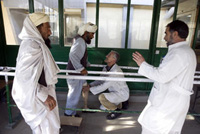Health in Post-Conflict and Fragile States
In spite of the compelling challenges associated with building legitimate governments, health systems development in post-conflict and fragile states has experienced important successes. The conference reviewed the last decade in health programming in post-conflict and fragile states, as well as addressed key questions about the intersection of health in "fragile states" and development, national security policy, and considered a way forward.
 Countries that have experienced armed conflict and political instability account for approximately 15 percent of the world's population. However, these same countries account globally for 30 percent of maternal deaths, 50 percent of children who die before the age of five, and a third of those affected by HIV/AIDs in developing countries. They face huge challenges in the planning, organizing, financing and sustaining health services. These hurdles are often exacerbated by the loss of infrastructure and the departure of health workers, in part as the result of attacks on health facilities.
Countries that have experienced armed conflict and political instability account for approximately 15 percent of the world's population. However, these same countries account globally for 30 percent of maternal deaths, 50 percent of children who die before the age of five, and a third of those affected by HIV/AIDs in developing countries. They face huge challenges in the planning, organizing, financing and sustaining health services. These hurdles are often exacerbated by the loss of infrastructure and the departure of health workers, in part as the result of attacks on health facilities.
In spite of the compelling challenges associated with building legitimate governments, health systems development in post-conflict and fragile states has experienced important successes. Questions still arise as to how health development in unstable and post-conflict states fits within donor global health priorities and policies, peacebuilding and stabilization, and human rights and governance.
The conference reviewed the last decade in health programming in post-conflict and fragile states, as well as addressed key questions about the intersection of health in "fragile states" and development, national security policy, and considered a way forward.
Speakers
(in alphabetical order)
- The Honorable Walter T. Gwenigale, MD
Minister of Health & Social Welfare of the Republic of Liberia - The Honorable Luka T. Monja, MD
Minister of Health for the Government of South Sudan - Jonathan D. Quick, MD, MPH
President & CEO, Management Sciences for Health - Michael Posner
Assistant Secretary of State for Democracy, Human Rights and Labor - Donald K. Steinberg
Deputy Administrator, U.S. Agency for International Development
Co-Sponsors and Partners
- International Medical Corps
- Johns Hopkins Bloomberg School of Public Health
- Children in Crisis Initiative, Stanford University
- John Snow, Inc
- Mailman School of Public Health, Columbia University
- Management Sciences for Health
- RTI International
- World Vision



